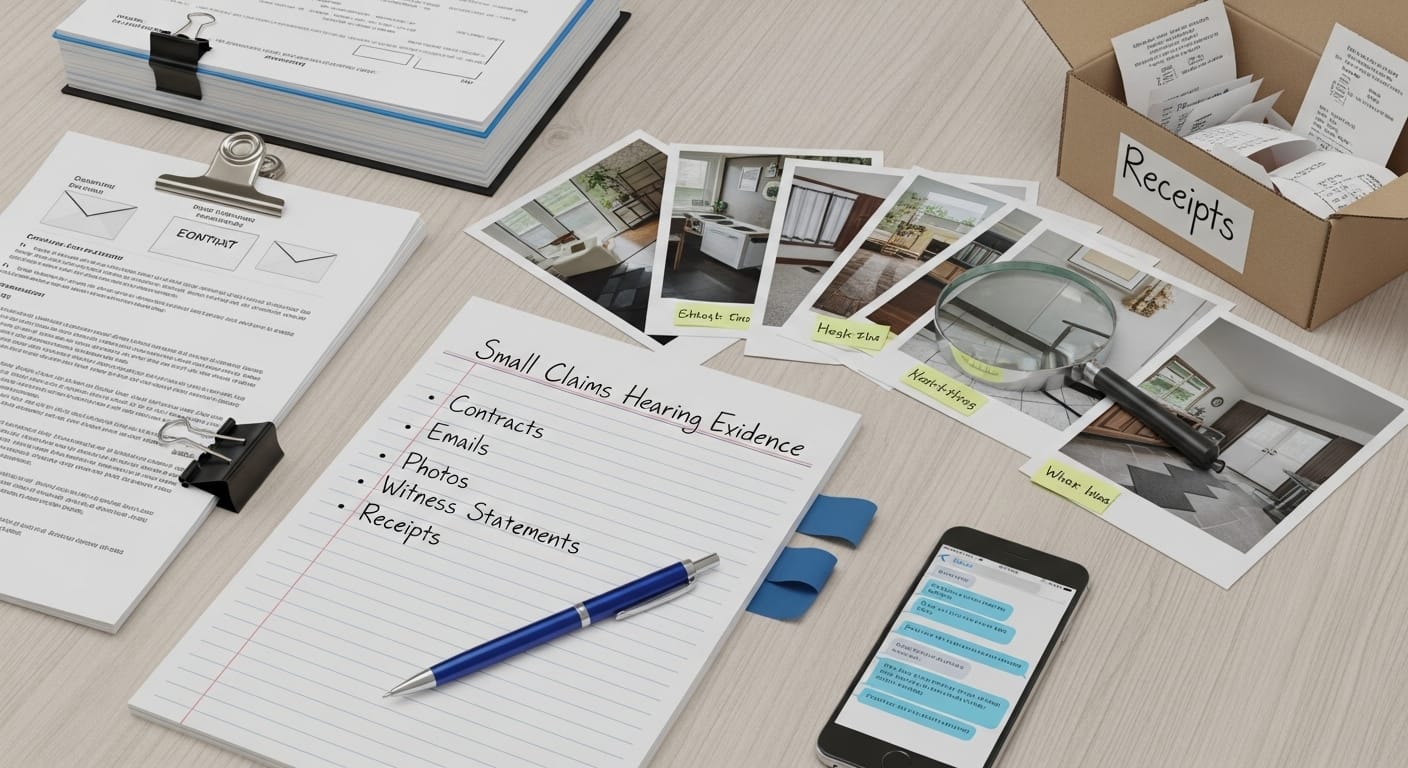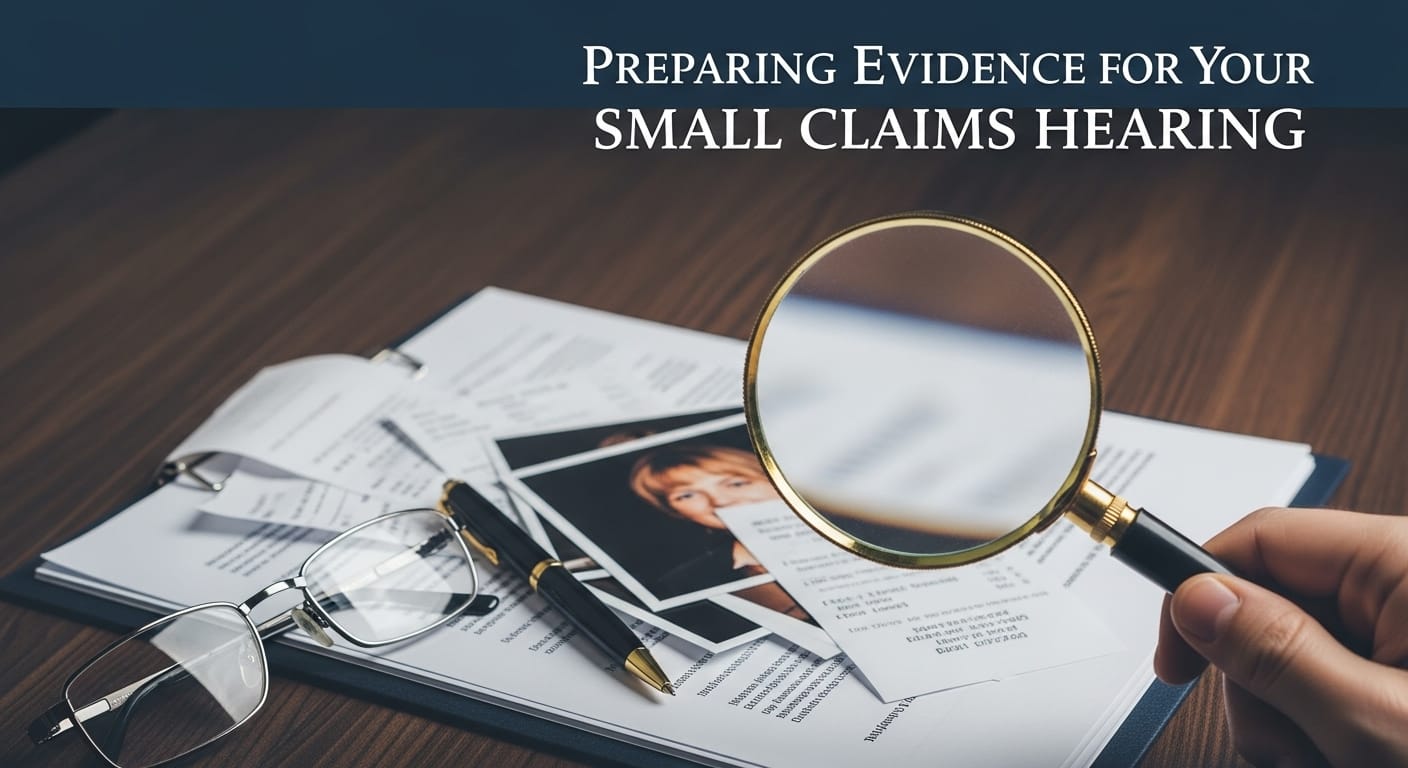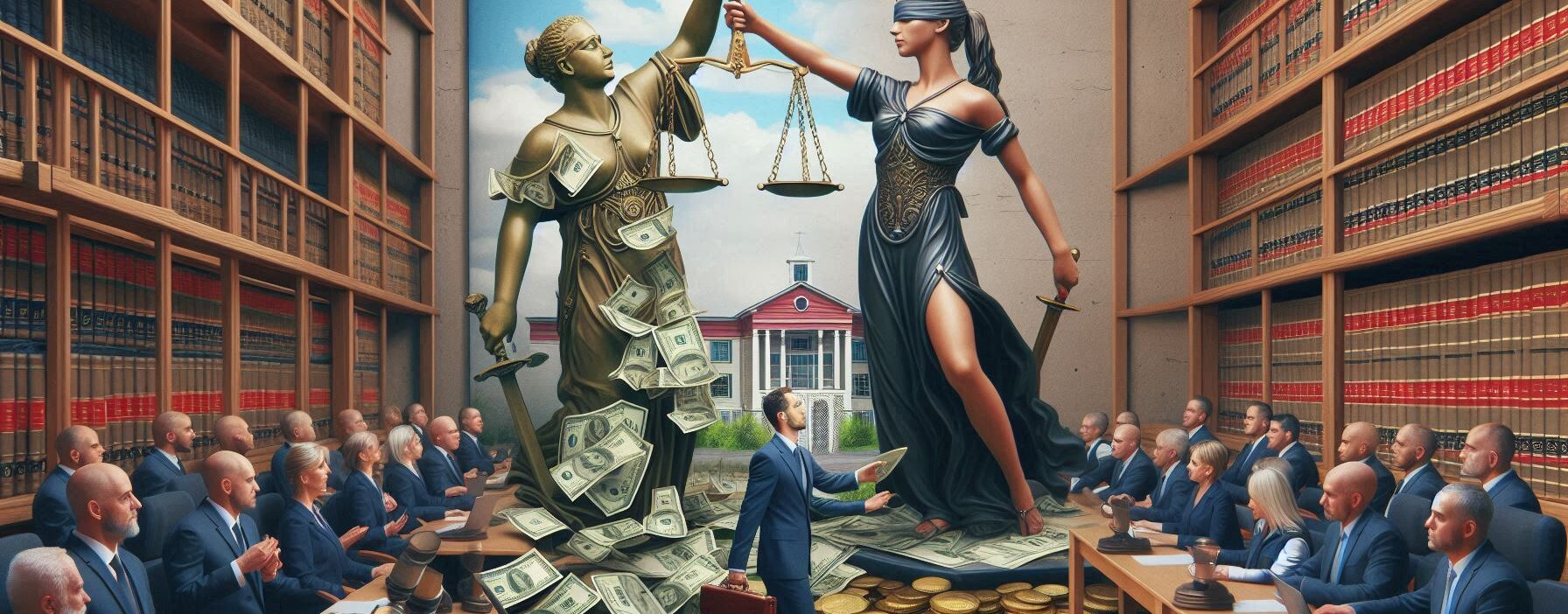Picture this: You’ve got a beef with someone, and you’ve decided to take them to small claims court. Maybe it’s an unpaid debt, a broken contract, or that time your neighbor borrowed your lawnmower and “forgot” to return it—honestly, who does that?
Whatever your case is, one thing is for sure: you’ll need to prepare solid evidence. After all, the judge isn’t going to take your word for it. They need facts, documents, and perhaps even some good old-fashioned proof that you’re not just a person with a good story. Let’s dive into how to get your evidence ready for the big day.

Top Takeaways and Key Concepts
Clearly define your claim to determine what type of evidence is most relevant.
Organize evidence in labeled folders or binders to present a coherent, professional case.
Prioritize quality over quantity; include only evidence directly supporting your claim.
Prepare witnesses in advance, ensuring they can testify and support your case effectively.
Use digital evidence carefully, preserving original formats and including dates, contacts, and context.
Summary of This Article
The article explains how to effectively prepare evidence for a small claims court case. It emphasizes defining your claim clearly, organizing relevant documents, and selecting high-quality evidence. Witnesses should be prepared ahead of time, and digital evidence must be preserved properly to ensure credibility. Presenting evidence simply and anticipating opposing arguments improves your chances of success. Staying calm and professional during unexpected challenges strengthens your case, making thorough preparation the key to persuasion in small claims court.
Start With the Basics: What Is Your Claim?

Before you even think about gathering evidence, it’s important to first understand what exactly you’re claiming. Are you asking for a refund? Are you seeking compensation for damages? Getting clear on your claim helps you determine what kind of evidence will be most effective.
If your claim is about a broken agreement, for example, your best bet is to gather the contract or any written communication that supports your case. If it’s about an unpaid debt, receipts, bank statements, or emails may come in handy. It’s like building a puzzle: each piece of evidence is a part of the bigger picture.
Organize Your Evidence: Paper Trail for Success
Now, let’s get organized. Nothing says “I’m prepared” like a well-organized stack of evidence. Keep in mind, the more organized you are, the more seriously the judge will take you. When you’re presenting evidence, you want everything in order. Picture yourself as a detective who’s pieced everything together in an airtight case.
You might want to use folders or binders, so each type of evidence has its own space. Label everything clearly. Trust me, nothing looks worse than flipping through a disorganized pile of papers while trying to find that one email that proves your point. It’s like trying to find your favorite T-shirt in a messy drawer—it’s there, but it might take a while.
Keep It Relevant: Quality Over Quantity
Here’s the thing: judges aren’t interested in seeing everything you’ve ever collected. They’re interested in seeing what directly supports your case. So, when it comes to evidence, quality beats quantity. That means, if you have an email chain that clearly shows the other party agreed to something, stick with that—don’t throw in unrelated stuff just because you think it “might” help.
Be ruthless in your selection. Does this piece of evidence show something that proves your case? If not, leave it out. The goal here is to be clear, concise, and relevant, not to overwhelm the judge with a mountain of paper.
Get Your Witnesses Ready: The More, the Merrier (Within Reason)
If you’ve got people who can back up your story, great! A witness can make your case much stronger. Think of witnesses as your legal sidekicks—they’re there to help you and provide extra credibility. However, be careful—too many witnesses can confuse the issue. You don’t need a whole cast of characters, just those who directly saw or heard something important to your case.
Reach out to your witnesses ahead of time, and make sure they’re willing to testify on your behalf. If they need to take time off work or rearrange their schedules, give them plenty of notice. The last thing you want is a key witness backing out at the last minute because they didn’t know they were needed.
Digital Evidence: Screenshots, Texts, and Emails
Let’s be honest, we live in a digital age, so it’s only natural that a lot of your evidence might be online. Did your neighbor agree to pay you back through a text message? Are you involved in a contract dispute that was conducted mostly through emails? Digital evidence is just as important as physical paperwork. In fact, sometimes it’s even more powerful, especially when it’s time-stamped.
However, digital evidence needs to be handled carefully. Don’t just take a screenshot of a text message and call it a day. Make sure to preserve the original format, and if you’re printing it out, include all relevant details like dates and contact information. This shows the judge that you’re not pulling a “trust me, it happened” move. You need to show the proof.
Presenting Your Evidence: The Power of Simplicity
When the day of the hearing arrives, you want your evidence to be simple, straightforward, and easy to present. Think of it like telling a story—you want the audience (in this case, the judge) to follow along without getting lost. Lay out your evidence in a logical order, and don’t overwhelm the judge with too much information all at once.
You don’t have to memorize every detail of your case, but you should be able to confidently point to the most important pieces of evidence when asked. Practice your presentation, even if it’s just in front of a mirror or your cat. The more you practice, the more natural you’ll feel during the actual hearing.
Anticipate the Opposition: What Will They Bring?
Now, I don’t want to be pessimistic, but let’s be real: the other side is going to present their own evidence. And it may be a lot less flattering than you’d like. So, what can you do? Anticipate it.
Take a moment to think about what kind of defense the other party might come up with. If they’re claiming you broke a contract or that you didn’t deliver on your promise, what evidence will they have? Are there any holes in their argument that you can counter with your own evidence? This is where thinking ahead can make all the difference. Be ready to address whatever they throw at you.
Be Prepared for the Unexpected: Stay Calm
Finally, it’s important to remember that things might not always go according to plan. Maybe the judge asks a question you weren’t expecting. Maybe your witness doesn’t show up. Maybe you discover a key document went missing (I know, I know—it’s the worst). But don’t panic. Just take a deep breath and stay calm.
This isn’t a movie where everything magically works out in the final scene. It’s about being prepared, thinking on your feet, and being as professional and composed as possible. If you stay calm and collected, you’ll appear much more credible, and the judge will appreciate your professionalism.
Conclusion: Evidence Is Your Power
In the end, preparing evidence is about more than just gathering a bunch of documents. It’s about crafting a clear, compelling narrative that proves your side of the story. The judge may not be on your side from the start, but with well-prepared, relevant evidence, you’ll have the best chance of persuading them. So, get your papers in order, stay calm, and walk into that hearing with confidence. You’ve got this!
Resources
How to Prepare for a Small Claims Hearing
https://www.nolo.com/legal-encyclopedia/how-to-prepare-for-small-claims-hearing
Small Claims Court: How to Present Evidence
https://www.legalzoom.com/articles/small-claims-court-how-to-present-evidence
The Importance of Evidence in Small Claims Court
https://www.lawhelp.org/us/resource/the-importance-of-evidence-in-small-claims-court
Frequently Asked Questions
What type of evidence is most important in a small claims hearing?
Relevant, clear, and factual evidence such as contracts, receipts, photos, and written communications are crucial to support your claim effectively.
How should I organize my evidence for court?
Arrange evidence in labeled folders or binders by category, ensuring easy access during the hearing. A clear, organized presentation strengthens your credibility.
Can I use digital evidence like texts or emails?
Yes. Digital evidence such as emails, screenshots, and texts is acceptable if preserved in its original format and includes timestamps, contacts, and context.
Should I bring witnesses to my small claims hearing?
Witnesses can support your claim with firsthand accounts. Choose credible individuals who directly observed key events related to your case.
How can I make my evidence presentation more effective?
Keep your presentation simple, logical, and focused on the key facts. Practice summarizing your main points so the judge can easily follow your argument.
What should I do if the opposing party presents conflicting evidence?
Stay calm, listen carefully, and use your evidence to counter inconsistencies. Focus on factual discrepancies and avoid emotional arguments.
How can I stay composed during unexpected challenges in court?
Remain calm, speak clearly, and stay professional. If something goes wrong, take a moment to regroup and address the situation respectfully and confidently.

Kevin Collier is a legal expert passionate about simplifying complex legal concepts for everyday individuals. With a focus on providing clear, practical information, he covers a wide range of topics, including rights, responsibilities, and legal procedures. Kevin aims to empower readers with the knowledge they need to navigate the legal landscape confidently, ensuring they can make informed decisions regarding their legal matters. Through insightful articles and easy-to-understand resources, he helps demystify the law, making it accessible to all.










